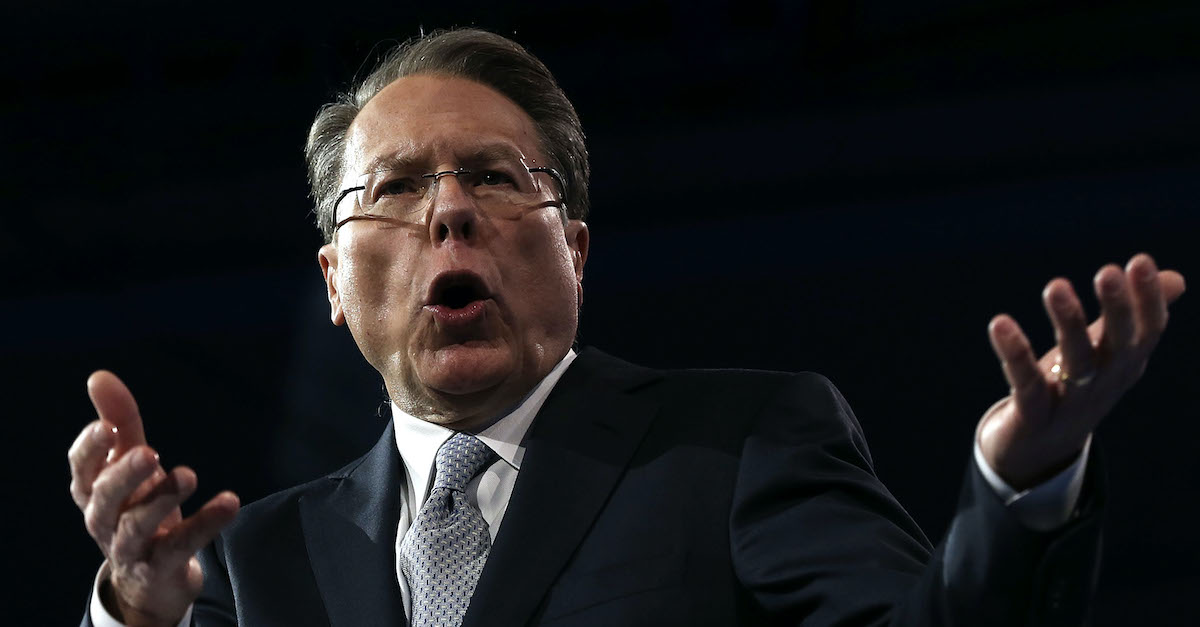
New York Attorney General Letitia James on Thursday filed a lawsuit seeking to dissolve the National Rifle Association (NRA). The case included a litany of allegations that top NRA officials engaged in fraudulent conduct. Among the named defendants in the lawsuit is NRA Executive Vice President Wayne LaPierre, who is accused of awarding contracts to close associates and family and granting lucrative no-show contracts to former employees in order to buy their silence and continued loyalty.
The suit also accused former Treasurer and Chief Financial Officer (CFO) Wilson “Woody” Phillips, former Chief of Staff and the Executive Director of General Operations Joshua Powell, and Corporate Secretary and General Counsel John Frazer of failing to manage the NRA’s funds and failing to follow numerous state and federal laws.
Here are the six craziest allegations contained from the lawsuit, the attorney general’s press release, and James’s press conference about the action.
(1) Wayne LaPierre, the national face of the NRA, is accused of exploiting his position to funnel millions of dollars into his own personal coffers, including more than $3.6 million on luxury car services.
The lawsuit accuses LaPierre of using a “poison pill contract” to ensure he would receive an income for life from the NRA worth more than $17 million and consolidating power within the organization by nefarious means. He used his position to “intimidate, punish, and expel anyone at a senior level who raised concerns about his conduct,” resulting in the diverting of “millions of dollars away from the charitable mission, imposing substantial reductions in its expenditures for core program services, including gun safety, education, training, member services and public affairs.”
Among the dozens of examples of lavish spending that LaPierre was reimbursed for included “private jet travel for purely personal reasons; trips to the Bahamas to vacation on a yacht owned by the principal of numerous NRA vendors; use of a travel consultant for costly black car services; gifts for favored friends and vendors; lucrative consulting contracts for ex-employees and board members; and excessive security costs.”
(2) The list of LaPierre’s personal expenditures is mind-blowing for the head of a charitable organization.
Specifically, LaPierre is accused of traveling with his family to the Bahamas by private plane at least eight times in an approximate three-year period, costing the organization more than $500,000. On many of those trips, LaPierre and his family were gifted the use of a 107-foot yacht owned by an NRA vendor. He and his wife also traveled to Africa for all-expense paid safaris, gifted by an NRA vendor.
Additionally, LaPierre allegedly received than “$1.2 million in expense reimbursements in just a four-year period for expenditures that included gifts for favored friends and vendors; travel expenses for himself and his family; and membership fees at golf clubs, hotels, and other member clubs.”
(3) Co-defendants Phillips, Powell, and Frazier are accused of conduct very similar to LaPierre’s.
“Like LaPierre, each of them regularly ignored, overrode or otherwise violated the bylaws and internal policies and procedures that they were charged with enforcing,” the AG’s lawsuit states. “As a result of these repeated violations, charitable assets were diverted to benefit NRA insiders and favored vendors.”
(4) Among other things, Phillips set up a $1 million deal for his girlfriend with NRA funds.
According to James’s office, while treasurer and CFO of the organization, Phillips was responsible for managing the NRA’s finances. Before his departure, he secured a contract for himself worth $1.8 million for “monthly consulting services to the incoming treasurer” and “set up a deal worth more than $1 million that benefitted his girlfriend.”
Phillips is also accused of overseeing “the financial practices that allowed millions of dollars in entertainment and travel expenses incurred by NRA executives to be fraudulently billed to the NRA as disbursements by the NRA’s largest vendor: Ackerman McQueen.” (Ackerman McQueen is described in the lawsuit as “the NRA’s public relations and advertising marketing firm.”)
(5) Powell went outside NRA contract process to hire his wife as a consultant for $30,000 per month, then hid that fact from NRA general counsel.
According to James, Powell broke NRA protocol by hiring a consulting firm, McKenna & Associates, without approval. Powell’s wife was then hired by McKenna for $30,000 a month, all of which was passed on to the NRA and which Powell hid from the organization’s attorneys “in an effort to not draw attention to and affirmatively hide the conflict of interest, and her role was not pre-approved by the NRA board, as the organization’s policy requires.”
(6) A.G. James likened dissolving the NRA to her office’s recent takedown of the president’s Trump Foundation charity.
During her press conference, James told reporters that investigators in her office “followed the facts and the law” in coming to the conclusion that the NRA’s conduct meant the organization had to be dissolved. “Just as we did with the Trump Foundation,” James said.
See below for the full lawsuit.
NY v NRA by Law&Crime on Scribd
[image via Alex Wong/Getty Images]